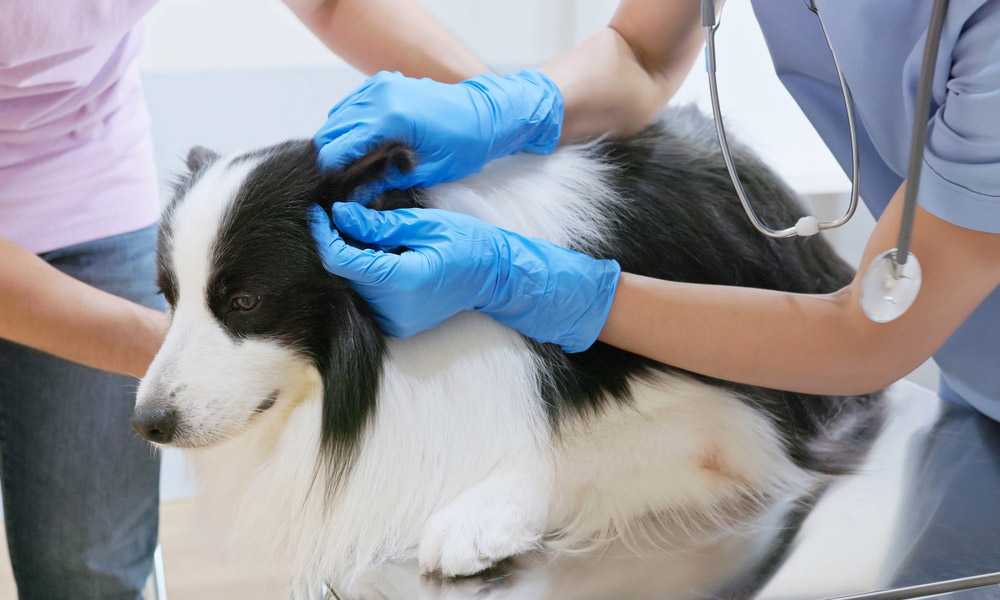Let’s face it—our canines are usually not the best mousers. However, sometimes it’s completely possible for your canine to get ahold of the mouse, and they might even eat the whole thing. Eating mice can be problematic for a few reasons.
These disease carriers not only infect your dog with specific ailments but put your dog at risk. So understand that this is a medical emergency and requires veterinary attention and Poison Control Center contact.
Contact Your Vet Immediately
Without delay, you should contact your veterinarian. Try to get them in quickly so you can get the problem taken care of right away. Sometimes your vet will have to administer treatment, including medications that induce vomiting, to remove the mouse from your pet’s system.
Your dog eating a mouse could be completely harmless, but not always—and you don’t want to take that chance. Mice can be full of disease, but that’s not even the most troubling part. Often, if your dog can catch a mouse itself, it could indicate that the mouse is very sick.
Or worse—the mouse could have already been dead, which can be even more troubling. If your dog has eaten a poisoned mouse, it can lead to a very wide spectrum of problems that can develop quickly. So action is necessary.
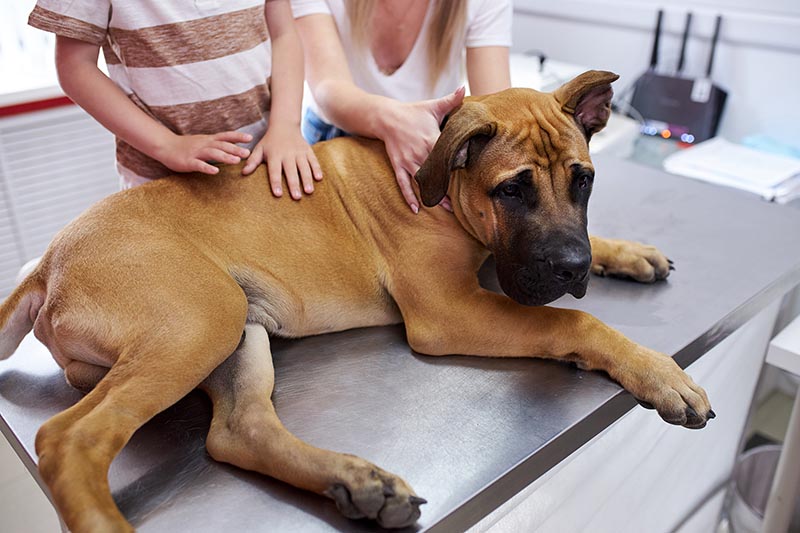
Detail as Much Information as Possible
To best help your veterinarian, you should catalog as many details as possible.
- Weight and age of the dog
- Day and time of occurrence
- Rodenticide information (if available)
- Signs noticed after consumption
There’s going to be a lot of chaos and commotion happening as this is a very time-sensitive matter. It’s OK if you are leaving in a panic and don’t have all of the information right up front; the best action route is to ensure your dog is getting the medical attention they need now.
Even if you don’t know that the mouse your dog consumed is poisonous, don’t take any chances. If you know that you put rodent insecticide in the home, you will want all the information about it regardless.
So, if you know there’s any chance of your dog coming into contact with these toxins, bring in all of the packaged information so your veterinarian can look it over. Sometimes, the products we put out to eliminate rodents are pet safe, and they can help your vet rule out larger problems.
What to Expect at the Vet
Before you get there, it’s helpful to call the poison control hotline for your region. Upon arrival, your vet will start performing tests immediately. Your vet will assess the situation to see what action should be following.
Your dog might not show any signs. However, they can quickly start to develop troubling signs. Rodenticides are formulated to kill rodents, and this high level of toxicity can cause internal bleeding, organ damage, and organ failure. Even small amounts of rodenticide can be lethal.
If your vet determines that inducing vomiting is necessary, they will try to remove as much of the poisoned mouse as possible. This step attempts to get toxins out of the body before they are absorbed. Typically, the veterinarian will prescribe activated charcoal to neutralize the poisons in the gut.
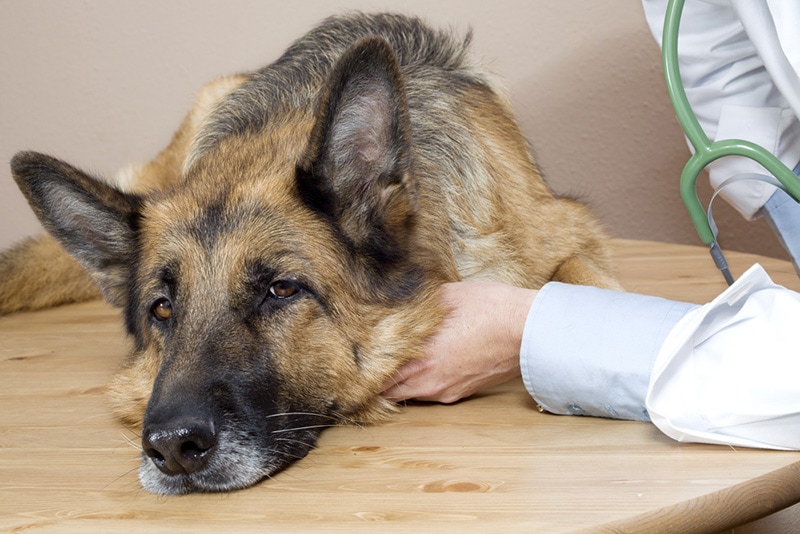
Dogs Eating Poisoned Mice
If you know that you have rat poison out, you should definitely be on high alert. If your dog caught hold of a poisoned mouse, it could quickly transfer into their system and cause significant problems.
If your dog caught and ate a mouse, it’s much more likely that they were poisoned, as poison affects the mouse’s ability to move quickly or efficiently. If the mouse is already dead, this is just as troubling. If your dog eats a poisoned mouse, the effects will also develop in them.
- Weakness
- Lethargy
- Nose bleeds
- Vomiting
- Coughing up blood
- Gum bleeding
- Rectal bleeding
- Bloody stools
- Bruising
- Labored breathing
Before you even arrive at your vet, you should take notes of every unusual sign you see. Eating a poisoned mouse will definitely be less damaging to the system than if they were to ingest the rodenticide on its own.
If your dog ever comes in contact with any rodenticide, it can cause all sorts of horrible issues, including internal bleeding.
Types of Rodenticides
Rodenticides vary from brand to brand. The effectiveness differs accordingly. Some of them are anticoagulants. That means the rodenticide works in the rodent’s system to keep blood from clotting. This causes internal bleeding leading to eventual death.
Sometimes death can be a lengthy process. During this time, the mouse’s body will slowly start to shut down and bleed from the inside out.
- Bromadiolone
- Chlorophacinone
- Difethialone
- Diphacinone
- Brodifacoum
- Warfarin
Others are non-anticoagulants that work by targeting the nervous system. It causes respiratory distress leading to eventual death.
- Bromethalin
- Cholecalciferol
- Zinc phosphide
 Disease Transmission from Mice to Dogs
Disease Transmission from Mice to Dogs
Poisoning is going to be the number one concern after your dog eats a mouse. However, there are other things you have to worry about. Mice can carry certain diseases and bacteria in their systems that can make your dog very sick.
Rat Bite Fever
Rat bite fever is an incredibly problematic issue that is easily transmitted from rodents to people and our beloved pets. As the name implies, your pup can get it if a mouse or a rat bites them, but that’s not the only way.
Despite the misleading name, rat bite fever can be transmitted by other rodents, including mice, guinea pigs, squirrels, and gerbils. It is caused by a bacteria known as Spirillum minus or Streptobacillus moniliformis. Spirilla minus is commonly found in Asia, whereas moniliform is prominent in North America.
If your dog is infected with rat bite fever, they can also spread it to you. So it is important to treat or prevent it entirely.
- Fever
- Vomiting
- Headache
- Muscle pain
- Swollen lymph nodes
Rat bite fever can have a very big delay between infection and showing signs. Typically, signs occur 2 to 14 days after contact. However, it is not uncommon for it to appear within 21 days after the initial contact.
Rat bite fever is typically very receptive to antibiotics. However, if it is not treated efficiently, it can cause issues like myocarditis, meningitis, pneumonia, and death.
Leptospirosis
Leptospirosis is a bacterial infection that mice and rats can carry. Typically, this disease is transmitted through rat urine, or contaminated soil and water. If your dog eats a mouse, it will likely come in contact with its feces and urine.
While it is much less likely, this bacterium can still infect your dog, particularly if they’re not vaccinated against it. Leptospirosis can be fatal and cause severe damage to vital organs like kidneys and liver.
- Increased thirst
- Fever
- Shivering
- Muscle tenderness
- Changes in urinary frequency
- Vomiting
- Diarrhea
- Appetite loss
- Lethargy
Even though leptospirosis is responsive to antibiotics, it might permanently impact your dog’s system. There is a vaccination that prevents leptospirosis for a year at a time, and any puppy over 12 weeks can receive it.

Mice Control in the Home
Using toxins to control mice populations in your home can pose significant risks to your pets and children. Mice can easily sneak into places where we live, so it is completely necessary to learn how to combat them without causing more significant issues.
Many rodenticides are designed to be pet friendly. Research the different options available in your region, and be sure to speak with your veterinarian.
You can also go the old-fashioned way and opt for traditional mouse traps. These traps will simply kill a mouse on contact and may arguably be more humane. Poisoning can sometimes be prolonged and painful for the creature, and there is often no reason to prolong suffering.
If you choose traditional snapping traps, just ensure they’re completely out of reach of pets and children in the home. Even though it won’t kill anyone, a snap can certainly hurt.
Conclusion
We hope you’re already on your way to the vet! They will determine the best course of action to treat your animal regardless of the outcome. Your dog eating a mouse is nothing to mess around with. It’s always better to be safe than sorry.
If they think in any way there’s a chance your dog could have been poisoned, they will respond accordingly. And remember to call the poison control hotline in your region for advice on the way to the vet. This will help you tremendously as well.
Related Reads:
- My Dog Ate a Dead Bird: Should I Be Worried? (Vet Answer)
- My Dog Ate Maggots: Should I Be Worried? (Vet Answer)
- My Dog Ate a Squirrel: Should I Be Worried? Our Vet Takes a Look
Featured Image Credit: SeventyFour, Shutterstock

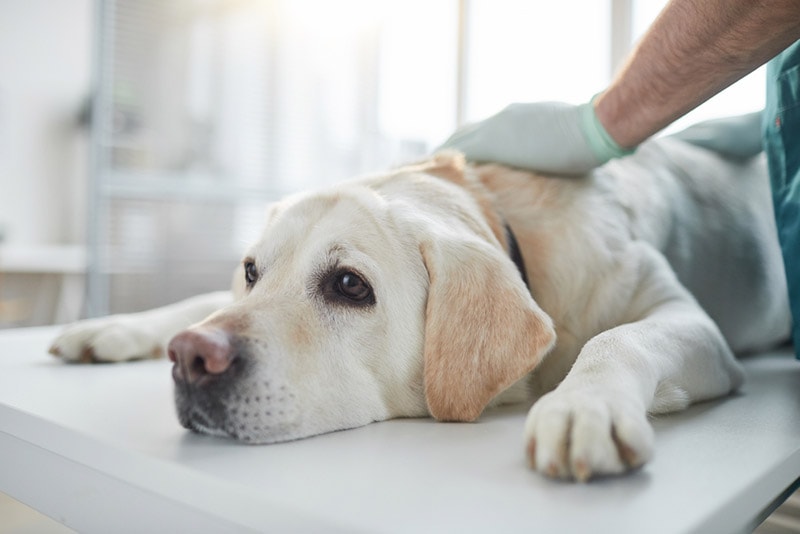
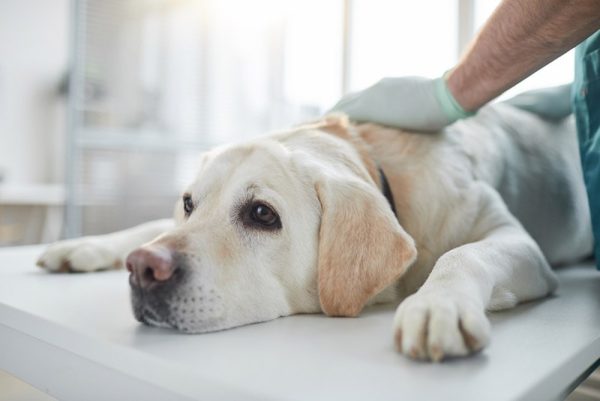

 Disease Transmission from Mice to Dogs
Disease Transmission from Mice to Dogs




